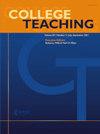运用评估促进大学代数学生成长心态
Q3 Social Sciences
引用次数: 0
摘要
摘要科学证据强调了成长型思维对学生成绩的积极影响。拥有成长心态的学生将错误和障碍视为成长的机会,并欢迎挑战和从错误中学习的机会。关于通过讲座和态度来促进成长心态的文章很多,然而,评估也可以成为鼓励学生成长心态的重要途径。在本文中,我们描述了我们如何使用评估来促进大学代数课堂上的成长心态。在接下来的章节中,我们将讨论对这些评估的需求以及开发这些评估的原则。然后,我们描述了我们创建的评估的三部分结构,它们是如何实施的,如何处理反馈和评分,以及学生对它们的反应。这是一种新颖的评估方法,可以促进成长心态,降低焦虑水平,正如学生调查反应所显示的那样。这重新定义了我们如何看待总结性评估,并允许我们将形成性评估元素,如返工和小组反馈,引入总结性评估的许多方面。以后的研究将用于显示更明确的结果,以改变学生的心态。关键词:评估成长性思维总结性披露声明作者未报告潜在利益冲突。本文章由计算机程序翻译,如有差异,请以英文原文为准。
Using Assessments to Promote Growth Mindset in College Algebra
AbstractScientific evidence highlights the positive impact of a growth mindset on student achievement. Students with a growth mindset view errors and obstacles as opportunities for growth and welcome challenges and the opportunity to learn from their mistakes. Much has been written about promoting growth mindset through lectures and attitudes, however, assessments can also be an important avenue for encouraging a growth mindset in students. In this paper, we describe how we used assessments to promote growth mindset in a college algebra class. In the sections that follow, we discuss the need for these assessments and the principles that underly their development. We then describe the three-part structure of the assessments we created, how they were implemented, how feedback and scoring was addressed, and student response to them. This is a novel approach to assessment that promotes growth mindset and lowered anxiety levels as was shown in the student survey responses. This reframed how we looked at summative assessments and allowed us to introduce formative assessment elements, like reworks and group feedback, into many aspects of the summative assessments. Later research will be used to show more definitive results for the change in mindset of students.Keywords: Assessmentformativegrowth mindsetsummative Disclosure statementNo potential conflict of interest was reported by the author(s).
求助全文
通过发布文献求助,成功后即可免费获取论文全文。
去求助
来源期刊

College Teaching
Social Sciences-Education
CiteScore
1.50
自引率
0.00%
发文量
33
期刊介绍:
College Teaching provides an interdisciplinary academic forum on issues in teaching and learning at the undergraduate or graduate level. The journal publishes three kinds of articles. Regular, full-length articles of up to 5,000 words reporting scholarship on teaching methods, educational technologies, classroom management, assessment and evaluation, and other instructional practices that have significance beyond a single discipline. Full-length articles also describe innovative courses and curricula, faulty development programs, and contemporary developments. Quick Fix articles, up to 500 words, present techniques for addressing common classroom problems. Commentaries, up to 1,200 words, provide thoughtful reflections on teaching.
 求助内容:
求助内容: 应助结果提醒方式:
应助结果提醒方式:


